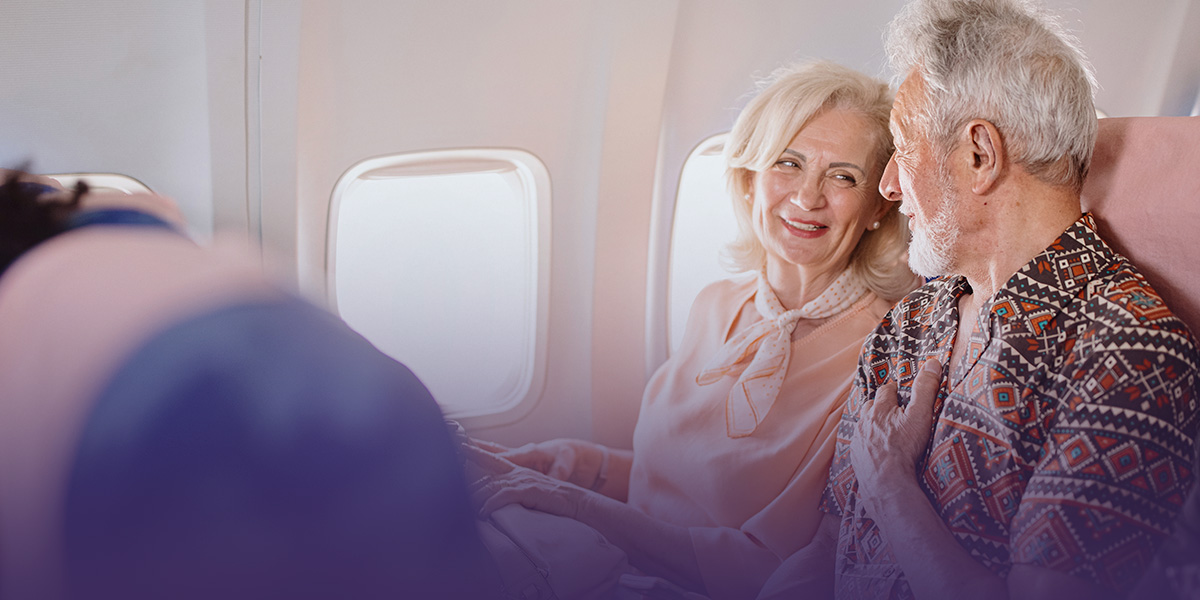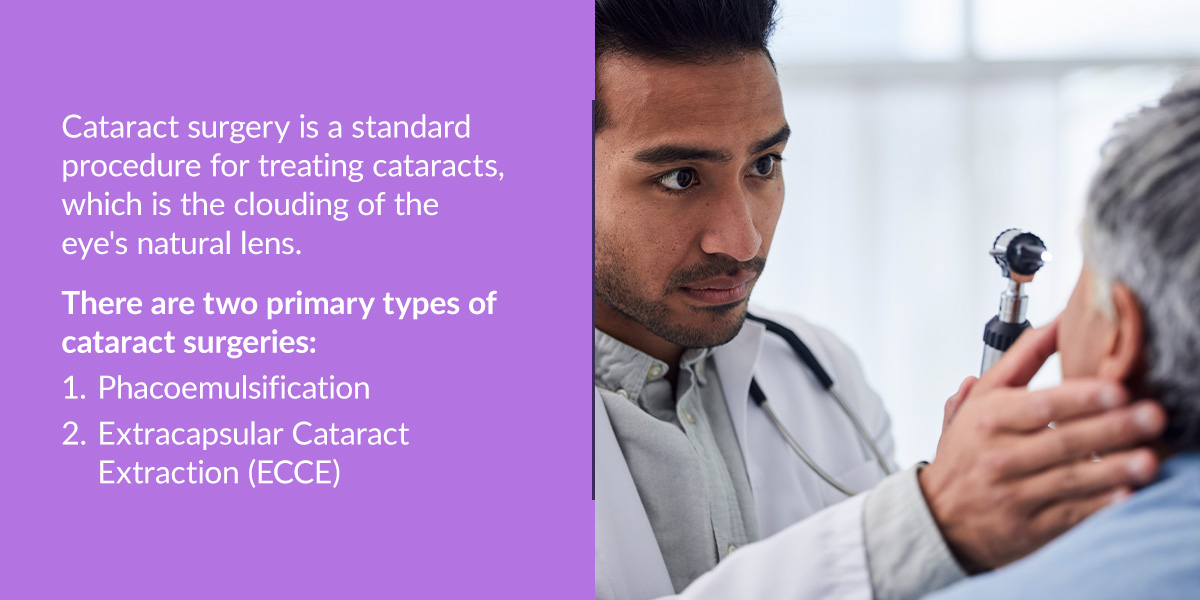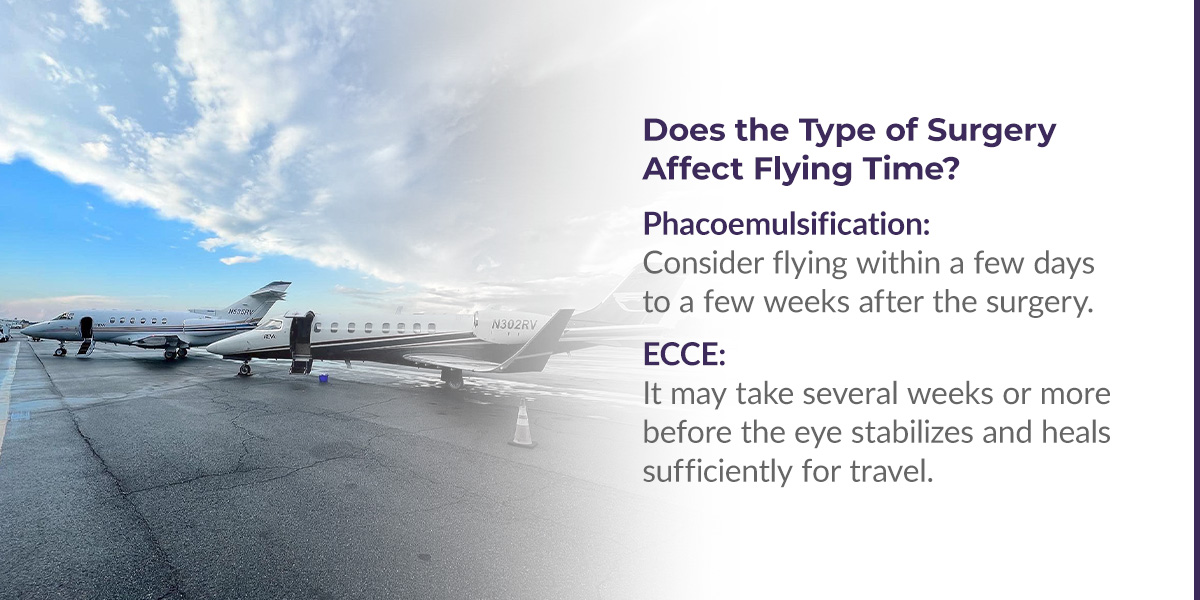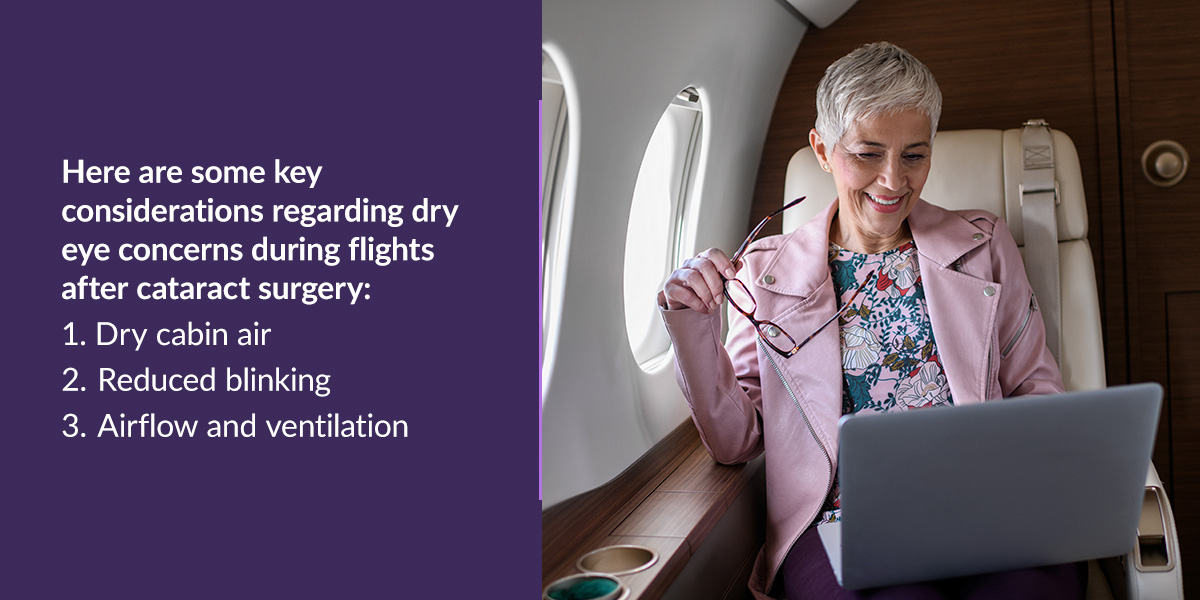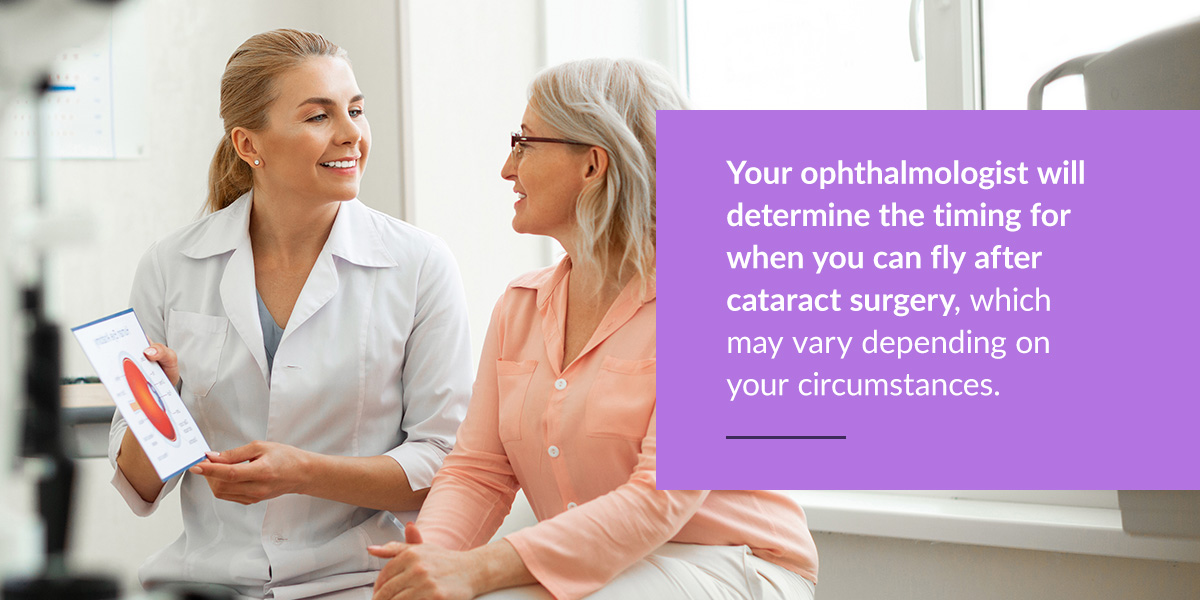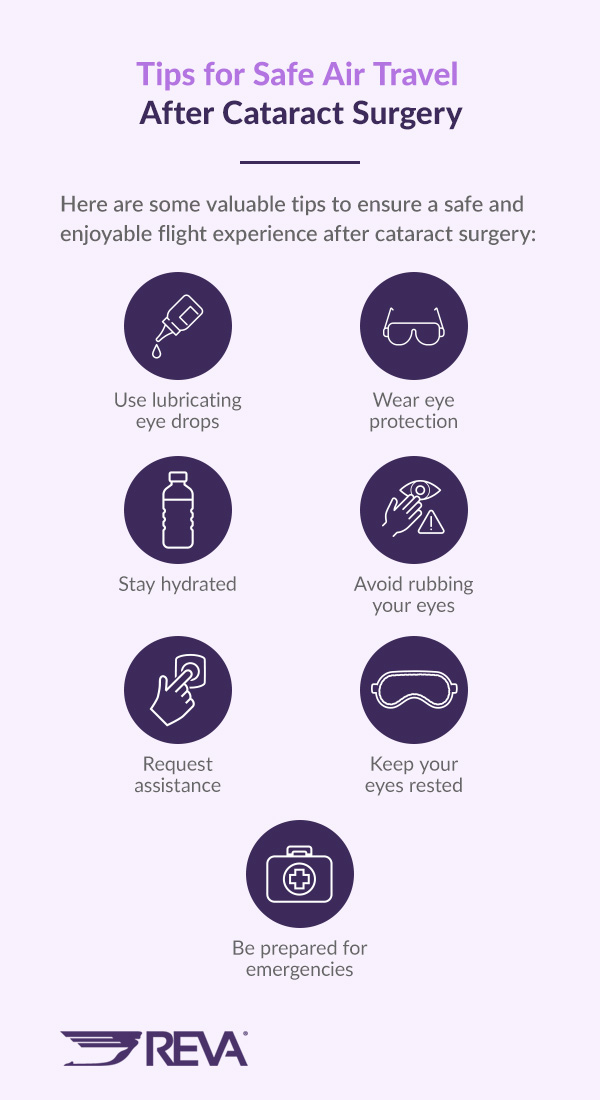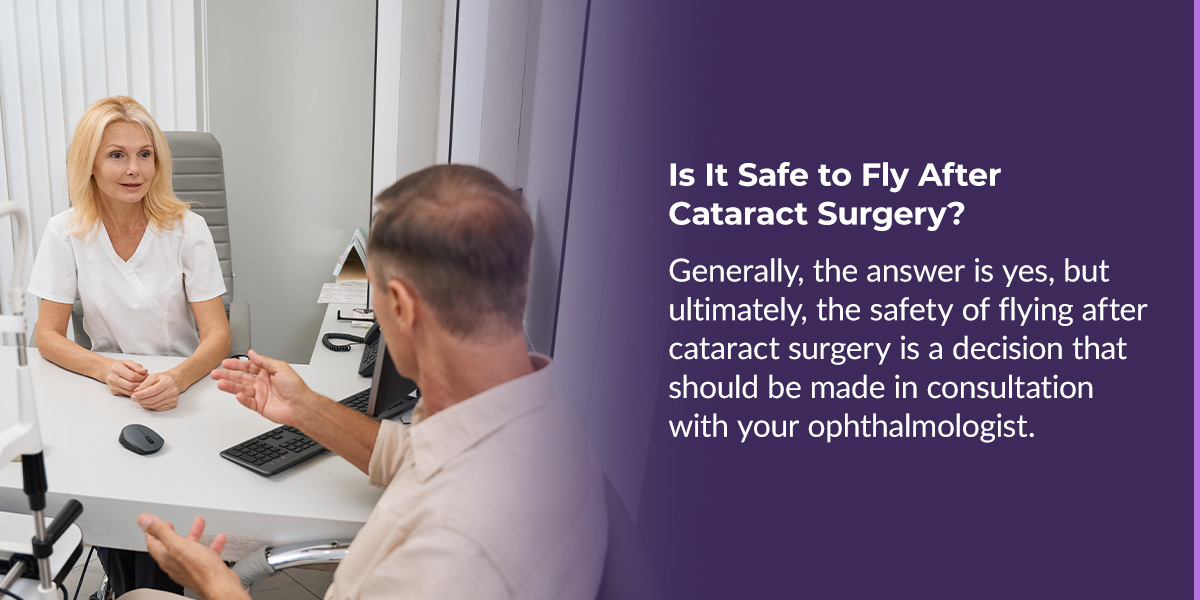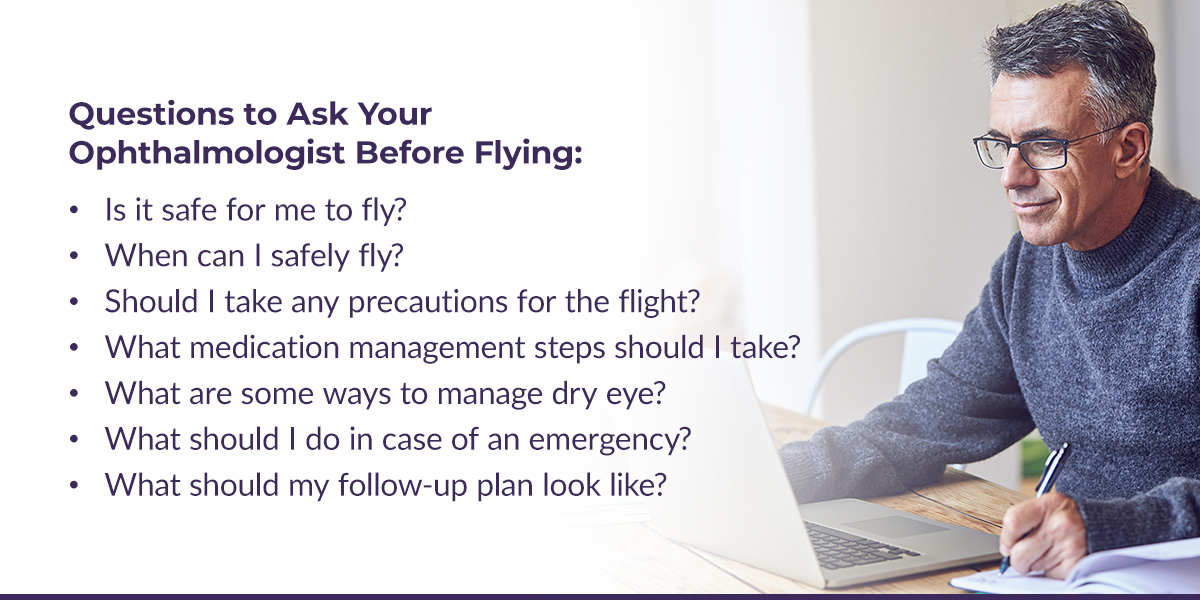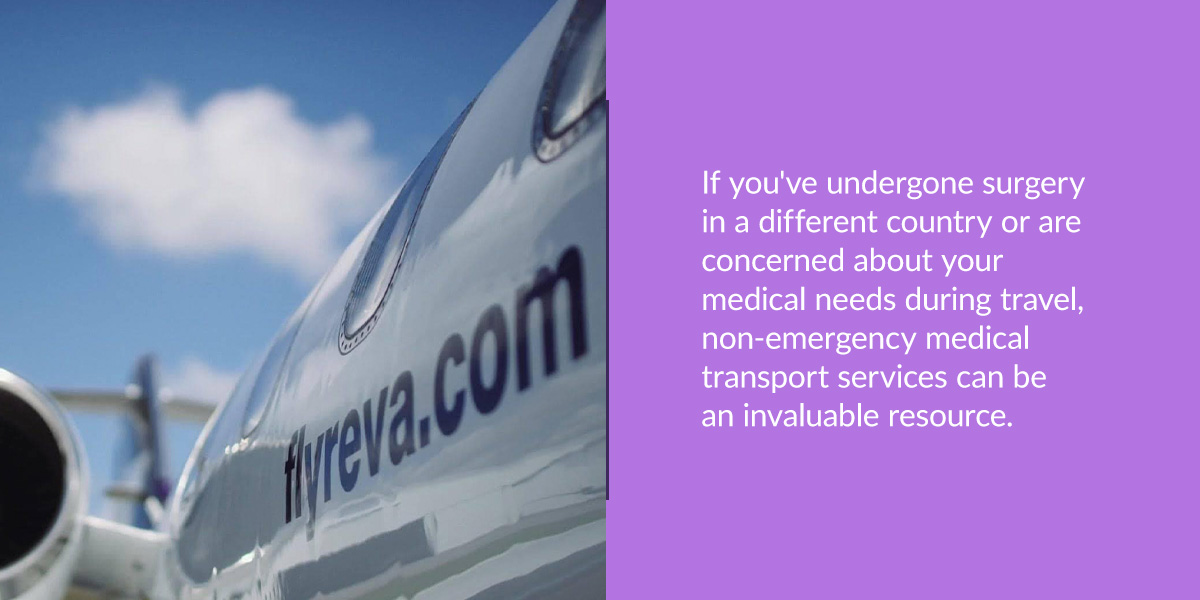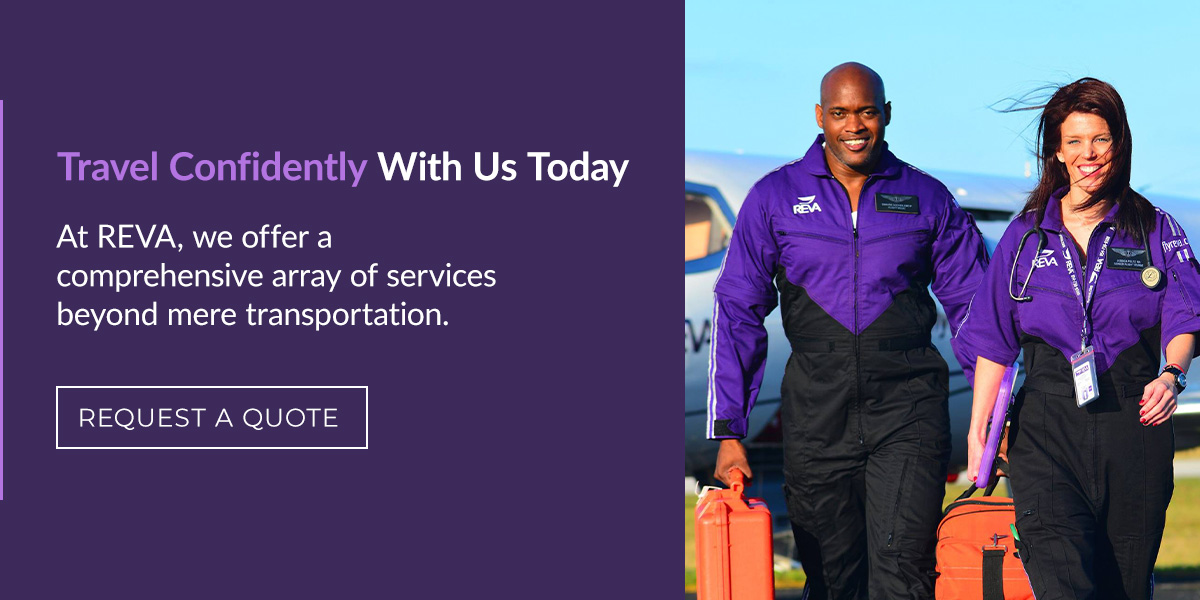Can You Fly After Cataract Surgery?
Cataract surgery has transformed the lives of millions worldwide since its inception. With over 500 million cataract surgeries conducted globally since 1995 and an astounding 60,000 procedures performed daily, it stands as one of modern medicine’s most successful surgical interventions. In the United States alone, approximately 4 million cataract surgeries are carried out yearly, improving people’s vision, health and quality of life.
As people consider this surgery to improve their vision, they often question if they can fly after eye surgery and how long it may be before they can resume their regular lives. This article will look at cataract surgery and considerations for post-operative care, specifically when you can fly after cataract surgery.
Common Cataract Surgeries
Cataract surgery is a standard procedure for treating cataracts, which is the clouding of the eye’s natural lens. There are two primary types of cataract surgeries:
1. Phacoemulsification
Phacoemulsification, commonly called “phaco surgery,” is the most common and widely used technique for cataract removal. It involves using an ultrasound device to break up the cloudy lens (cataract) into small fragments, which are then suctioned through a tiny incision.
After removing the cataract, an artificial intraocular lens (IOL) is implanted to replace the natural lens. The IOL helps restore clear vision. There are various types of IOLs available, including monofocal, multifocal and toric lenses, which can address different vision needs.
2. Extracapsular Cataract Extraction (ECCE)
Extracapsular cataract extraction (ECCE) is an older and less commonly used surgical technique than phacoemulsification. It is typically reserved for more complex cataract cases where phaco surgery may not be suitable.
The surgeon makes a larger incision — around 10 to 12 millimeters — on the eye’s surface. The surgeon surgically takes out the cloudy lens in one piece, leaving the back portion of the lens capsule intact.
In most cases of ECCE, the natural lens is replaced with an IOL, similar to phaco surgery. However, the larger incision and more invasive nature of ECCE may require stitches to close the wound.
Postoperative Period of Cataract Surgery
The postoperative period following cataract surgery can vary in duration depending on the type of surgery, the individual patient’s healing process and the surgeon’s recommendations.
The immediate postoperative period typically spans the first few days to weeks after cataract surgery. Here are a few things you can expect during this period:
- Sight: Vision is often reduced or blurry immediately after surgery, gradually improving over this period.
- Sensitivity: Some discomfort, redness and sensitivity to light are common in the first few days.
- Protection: Eye patches or shields may be used to protect the surgical site.
- Medications: Medications, including eye drops and oral medications, will be prescribed to manage inflammation, prevent infection and control intraocular pressure.
Does the Type of Surgery Affect Flying Time?
The time it takes to be able to fly after cataract surgery can vary depending on the surgical technique used and individual factors. Here’s a general guideline for when you might be able to consider flying after the two common cataract surgery techniques:
- Phacoemulsification: Many patients who undergo phaco surgery can potentially consider flying within a few days to a few weeks after the surgery. Ensure you have a follow-up appointment with your ophthalmologist to assess your eye’s healing and stabilization before planning any air travel. They will provide personalized guidance on when it is safe for you to fly.
- ECCE: Patients who undergo ECCE may need a longer recovery period before considering air travel. It may take several weeks or more before the eye stabilizes and heals sufficiently for travel. Chat with your surgeon to monitor your progress and receive clearance for flying when it’s safe.
In both cases, the specific timing for flying after cataract surgery should be discussed with your ophthalmologist. They will consider your case, the surgical technique used and the stability of your eye before guiding when you can safely travel by air.
Why Is Flying a Concern for Cataract Surgery?
You might think sitting in a chair for hours while flying shouldn’t affect your eye surgery. In fact, relaxing and staring out a window might sound ideal for the healing process. However, a few aspects of air travel might be cause for concern after eye surgery.
Dry Eyes
Flying can exacerbate dry eye symptoms due to the dry cabin air and changes in atmospheric conditions inside an airplane. Here are some key considerations regarding dry eye concerns during flights after cataract surgery:
- Dry cabin air: The air inside an airplane cabin is typically low in humidity, which can lead to increased evaporation of tears and worsen dry eye symptoms. This dry air can cause discomfort, itching, burning and a gritty eye feeling.
- Reduced blinking: The reduced blink rate during air travel can further exacerbate dry eye symptoms. People tend to blink less frequently when focused on activities like reading or watching movies, decreasing tear production. Even when individuals blink while looking at screens, the blink may be incomplete or ineffective at distributing tears. Partial blinks can result in dry spots on the eye’s surface.
- Airflow and ventilation: Airflow from overhead vents and air conditioning can create drafts that can dry out the ocular surface.
To reduce the risk of dry eyes during screen time, consider the following tips:
- Follow the 20-20-20 rule: Take a 20-second break every 20 minutes and look at something at least 20 feet away to allow your eyes to blink and refocus.
- Blink intentionally: Make a conscious effort to blink fully and frequently while using screens.
- Use artificial tears: Lubricating eye drops, such as preservative-free artificial tears, can help maintain moisture on the eye’s surface. Use them as needed, following the instructions on the product label and your surgeon’s advice.
- Maintain proper screen position: Ensure your screen is at eye level to reduce the need to angle your head downward, which can lead to incomplete blinking, making it uncomfortable to fly after eye surgery.
- Adjust screen brightness and contrast: Optimize your screen settings to reduce glare and minimize eye strain.
Other Concerns When Flying After Eye Surgery
Another concern is the availability of medical care during a flight. While most flights have basic medical supplies and assistance, the level of care may not be sufficient for addressing post-surgery complications.
Airplanes are also enclosed spaces with circulating air, potentially increasing the risk of exposure to airborne pathogens. Individuals who have recently undergone cataract surgery may have a slightly elevated risk of infection, and it’s essential to take precautions to minimize this risk.
How Soon Can You Fly After Cataract Surgery?
Your ophthalmologist will determine the timing for when you can fly after cataract surgery, which may vary depending on your circumstances. Most patients are generally advised to wait at least a day to a few weeks.
Here are a few factors to take into consideration regarding cataract surgery and flying:
- Individual factors: The timing for resuming air travel after cataract surgery varies from person to person and depends on several individual factors. Your ophthalmologist will assess your specific situation, considering factors such as the type of surgery, your overall health and the stability of your eye.
- Follow your surgeon’s recommendations: The most important step in determining when it’s safe to fly after cataract surgery is to follow your surgeon’s advice.
- Healing and stability: Your surgeon will want to ensure your eye has healed adequately and the surgical site is stable before giving you the green light for air travel.
Tips for Safe Air Travel After Cataract Surgery
Air travel can be an exciting prospect after cataract surgery, but it’s essential to prioritize your eye health and comfort during the journey. Here are some valuable tips to ensure a safe and enjoyable flight experience after cataract surgery:
- Use lubricating eye drops: Cabin air in airplanes can be dry, which may exacerbate dry eye symptoms. Carry preservative-free lubricating eye drops recommended by your surgeon. Use these drops as directed during the flight to keep your eyes moist and comfortable.
- Wear eye protection: Wear sunglasses with UV protection to protect your eyes from potential irritants and bright sunlight during travel. Sunglasses also shield your eyes from the dry cabin air around you.
- Stay hydrated: Drink plenty of water before and during your flight to maintain overall hydration. Limit caffeine and alcohol intake, as they can contribute to dehydration.
- Avoid rubbing your eyes: Resist the urge to rub your eyes during the flight, as this can introduce bacteria and potentially harm the healing eye. If you experience itching or discomfort, use lubricating drops instead.
- Request assistance: Inform airline staff about your recent cataract surgery when boarding. They can assist with boarding, finding your seat and stowing your carry-on luggage.
- Keep your eyes rested: If you have a long flight, try to rest and get some sleep to reduce eye strain and fatigue.
- Be prepared for emergencies: Carry a small travel-sized kit with essentials like lubricating eye drops, tissues and any necessary medications in case of delays or emergencies.
Does Flying After Cataract Surgery Affect Insurance?
If you travel internationally for surgery or follow-up care, review your insurance policy to understand coverage limitations and whether you need additional travel insurance for international health care.
Travel insurance can help you manage unexpected situations, expenses and travel disruptions that may arise during air travel with cataract surgery. Here’s how travel insurance can be beneficial in the context of flying after cataract surgery:
- Trip cancellation and interruption coverage: Travel insurance often includes trip cancellation and interruption coverage. If your surgery date needs to be rescheduled due to unforeseen medical reasons or your trip is interrupted or canceled, this coverage can help reimburse your non-refundable expenses, such as flight tickets, accommodations and tour reservations.
- Emergency medical coverage: While standard medical insurance may not cover the cost of flying for postoperative care, travel insurance can provide emergency medical coverage during your trip. This includes coverage for unexpected medical emergencies, hospital stays and physician fees incurred while traveling.
- Preexisting medical conditions: Check policies that offer options to cover preexisting medical conditions, including those related to cataract surgery. Be sure to disclose your medical history and conditions to the insurer and consider purchasing a policy with this coverage if applicable.
FAQs About Flying After Cataract Surgery
Here are answers to some of the most frequently asked questions about air travel after cataract surgery:
Is It Safe to Fly After Cataract Surgery?
Generally, the answer is yes, but ultimately, the safety of flying after cataract surgery is a decision that should be made in consultation with your ophthalmologist. They’ll assess your case and provide guidance to ensure a safe and comfortable journey. Always prioritize your eye health during this postoperative period.
Is It Safe to Travel Long Distances by Air After Cataract Surgery?
Long-distance air traveling after cataract surgery is possible, but it’s important to consider your comfort and follow your surgeon’s recommendations. Adequate hydration, lubricating eye drops and precautions against eye strain will make all the difference.
What Should You Do if Something Happens While Flying?
It’s important to note that most individuals undergoing routine cataract surgery can safely travel by air without complications. Still, you should be prepared and informed, follow your surgeon’s recommendations and seek assistance if you experience any unusual symptoms or discomfort during the flight. Consultation with your ophthalmologist before travel will ensure you are in the best possible condition for air travel after eye surgery.
If you experience any discomfort or complications related to your eyes while flying after cataract surgery or any eye surgery, take prompt action to address the issue. Here’s what to do if something happens while flying:
- Stay calm: Remain calm and composed if you encounter any eye-related discomfort or issues during the flight. Panic can exacerbate the situation.
- Inform cabin crew: Alert the cabin crew to your situation. They are trained to handle medical emergencies and can provide assistance or contact the airline’s medical personnel if necessary.
- Eye drops: If you have prescribed lubricating eye drops, use them as directed. Lubricating eye drops can help alleviate dryness and discomfort.
- Avoid rubbing your eyes: Refrain from rubbing or touching your eyes, as this can worsen irritation or discomfort.
- Close your eyes gently: If your eyes are feeling uncomfortable, consider closing them gently to rest and protect them from further irritation.
- Contact your surgeon: If the issue persists or you have any concerns about your eye’s condition, contact your ophthalmologist as soon as possible. They can provide advice over the phone and determine whether further action or evaluation is necessary.
Questions to Ask Your Ophthalmologist Before Flying
Your ophthalmologist is your best source of information and guidance regarding air travel after cataract surgery. Open and clear communication with your surgeon will help ensure a safe and enjoyable journey. Here are some questions to ask your ophthalmologist after surgery and before flying:
- Is it safe for me to fly? Begin by asking your ophthalmologist if it is safe for you to travel by air after your cataract surgery. They will consider factors such as the surgical technique used, your healing progress and any specific concerns about your eye health.
- When can I safely fly? Inquire about the recommended timing for air travel. Your surgeon can provide guidance on when it is safe to fly based on your surgery and recovery.
- Should I take any precautions for the flight? Ask if you should take any specific precautions during the flight, such as using lubricating eye drops, wearing eye protection or avoiding certain activities.
- What medication management steps should I take? Discuss managing your post-operative medications, including eye drops, during the flight. Ensure you understand how to administer them in the cabin environment.
- What are some ways to manage dry eye? Inquire about strategies to manage dry eye symptoms that may arise during the flight. Your surgeon can recommend specific lubricating eye drops or other measures to keep your eyes comfortable.
- What should I do in case of an emergency? Discuss what to do in case of an emergency or discomfort during the flight.
- What should my follow-up plan look like? Confirm whether you should schedule a follow-up appointment with your ophthalmologist after your trip and how to reach them in case of any concerns or complications.
If you have any additional medical conditions or factors that may impact your ability to fly comfortably and safely, share them with your ophthalmologist for personalized guidance.
Do You Need a Medical Escort or Air Ambulance?
Whether you need a medical escort after cataract surgery depends on your specific circumstances, surgery type and overall health. In most cases, individuals who have undergone routine cataract surgery do not require a medical escort for transportation after the procedure. Cataract surgery is considered a minimally invasive and low-risk procedure.
However, if you’ve undergone surgery in a different country or are concerned about your medical needs during travel, non-emergency medical transport services can be an invaluable resource to ensure your safe return home and continued care. Non-emergency medical transport services are designed to offer peace of mind and convenience when arranging flights, ensuring your medical needs are met during the journey.
REVA supplies non-emergency medical transportation services to address these specific needs. Our services are tailored to ensure the safe and comfortable transport of patients who require medical assistance during their journeys.
Travel Confidently With Us Today
At REVA, we offer a comprehensive array of services beyond mere transportation. We’ve been at the forefront of patient transport for over three decades, providing safe, modern and highly professional air-medical jet transportation for passengers worldwide. REVA embodies the highest standards of professionalism, ensuring your postoperative or medical travel experience is as smooth, comfortable and secure as possible.
Whether you’re undergoing cataract surgery or have another health concern that may make traveling on a commercial airplane more complex, request a quote for medical air transportation today.

